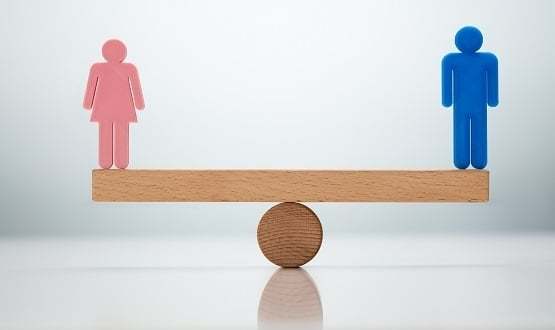Government criticised for not collecting sex disaggregated Covid-19 data
- 7 April 2020

The Government has come under fire for failing to identify the sex of patients in its newly launched Covid-19 data collection tool.
The Coronavirus Status Checker, launched by Health Secretary Matt Hancock on 4 April, asks people to with potential coronavirus symptoms to answer a series of questions about their experience and the NHS services they’ve used.
The answers will help the NHS build up additional data on the virus and inform future responses, such as when and where more resources like oxygen, ventilators and additional staff might be needed. It will also be used to provide valuable insight into the development and progression of the virus across the country.
The Checker asks why a person is staying at home; how they are feeling; whether they have other health problems; their date of birth, their postcode; and how many people are living in their home.
But the questionnaire fails to ask participants for their sex, resulting in a data gap that “needs to be addressed immediately”, according to campaigner Caroline Criado-Perez.
The Invisible Women author tweeted: “The official UK government NHS Covid-19 data collection does not ask for sex.
“If coronavirus has surely proven anything it’s that sex-disaggregated data matters.”
https://twitter.com/CCriadoPerez/status/1247099505931149312
Upon launching the tool, Hancock said: “We must learn as much as possible about this virus, and we are asking the whole nation to join this effort.
“If anyone has experienced symptoms of Covid-19, I would urge you to use our new status checker app to help us to collect essential information on the virus and allow us to better allocate NHS resources where they are needed most.”
The tool will form part of a core national Covid-19 dataset, held by NHS England.
Failing to account for the sex of the person filling out the questionnaire would likely result in an ill-informed response from the NHS.
Analysis of cases in China has found the death rate among men is higher than women – 2.8% compared to 1.7%.
Italy has followed a similar pattern, with men making up 60% of confirmed cases and more than 70% of those who have died, according to the countries main public health research agency.
Men were also more likely to die during the SARS and MERS outbreaks, in 2003 and 2012 respectively, both caused by similar coronaviruses.
Scientists are unsure what’s causing men to be at greater risk during this pandemic, which is why collecting sex disaggregated data is vital.
According to Global Health 50/50, an initiative to advance gender equality in global health, evidence so far suggests sex and gender are “important drivers of risk and response to infection and disease”.
“In order to understand the role gender is playing in the Covid-19 outbreak, countries urgently need to begin both collecting and publicly reporting sex-disaggregated data. At a minimum, this should include the number of cases and deaths in men and women,” it said in a statement.
Global Health 50/50 has launched a Covid-19 sex disaggregated data tracker, compiling the number of cases and deaths reported by sex across countries with the highest numbers of cases. The UK is among 12 countries not reporting cases and deaths by sex, alongside Russia, the US and Turkey.
Criado-Perez has long campaigned for the inclusion of sex-disaggregated data in government planning and medical research for a myriad of reasons, including that men and women experience health conditions differently and are therefore likely to be affected by different symptoms and react to different treatments.
It’s for that reason it’s vital the NHS knows the sex of the person experiencing symptoms, to better inform their understanding of the virus.
If the NHS can better understand how Covid-19 symptoms manifest in men and women, it increases the chances of the virus being picked up at an earlier stage. It also allows the NHS to better for the virus, rather than adopting a blanket approach when data clearly shows the virus affects sexes differently.
Ending the gender data gap
Criado-Perez gave a keynote speech at Digital Health Rewired on 4 March, highlighting the importance of ending the gender data gap.
She spoke of a University of Leeds study that found women were 50% more likely to be misdiagnosed when having a heart attack because they exhibit different symptoms to men.
It’s just one example of how failing to collect sex disaggregated data puts patients’ lives at risk.
Speaking previously on the importance of sex disaggregated data, Criado-Perez told Digital Health News: “It’s fundamental and non-negotiable, as far as I am concerned, because the information we have determines the way we allocate resources… the way we design anything from government policy to transport to technology to medicine, to anything you can think of.
“We don’t just design things blind, we design them based on whatever information we have.”
The Department for Health and Social Care has been contacted for comment.






1 Comments
The questionnaire is not just failing on this point
Why is there no questionnaire out there asking us if we think we have already experienced covid 19 symptons and when?
What is the point of asking everyone if they have been tested positive? Apart from the fact there is little testing being done, the public are told to self isolate and only call if they worsen! Therefore many may have already had this virus, and is this not extremely important data to be collected as well?
Useful data is not being collected because the questionnaire is only aimed at those currently with symptons Somebody needs to start asking us DO WE THINK WE HAVE ALREADY HAD THIS VIRUS!!
Comments are closed.